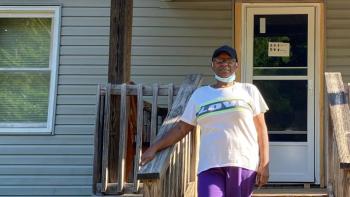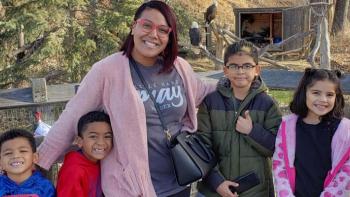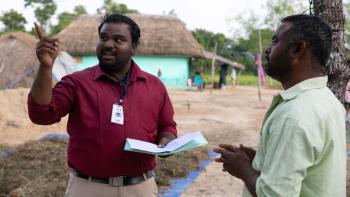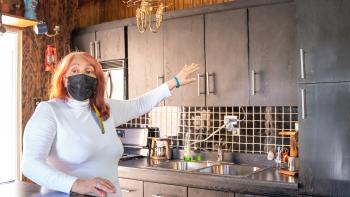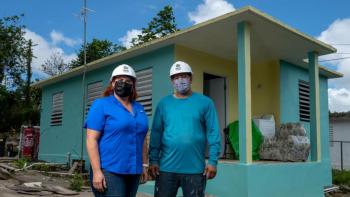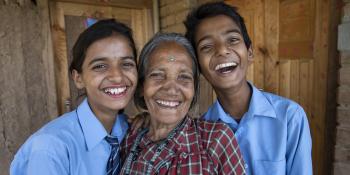Habitat for Humanity’s corporate partners to support affordable housing this holiday season
Lazy Dog Restaurant & Bar celebrates the holiday season with the sweet return of DIY gingerbread house kits supporting Habitat for Humanity
Home makes the difference
David wanted nothing more than to provide a safe and decent home for his young son and daughter. Now, with the support of Habitat and the Wells Fargo Foundation, his family lives in an affordable home where they can thrive.
On move-in day, 4-year-old Grayson and his sister, 8-year-old Cadence, sprinted into their new bedrooms. “They were so excited,” says their father, David. “They explored every little inch of the house.”
Move-in day meant relief for the family of three. An expensive housing market had made it difficult to find safe and affordable housing, forcing David and his kids to move in with his parents. David dreamed of owning his own home that allowed Cadence and Grayson their own rooms and more space for them all. He wanted to raise his kids near family in the community they’ve always known and loved, but it didn’t seem possible.
When David’s mother saw a news article about a new townhome community being built by Bend-Redmond Habitat for Humanity, she encouraged him to apply. David’s hope grew as he passed each milestone in the application process. “Once I got to the third stage, I started to imagine I’d actually get accepted,” he says.
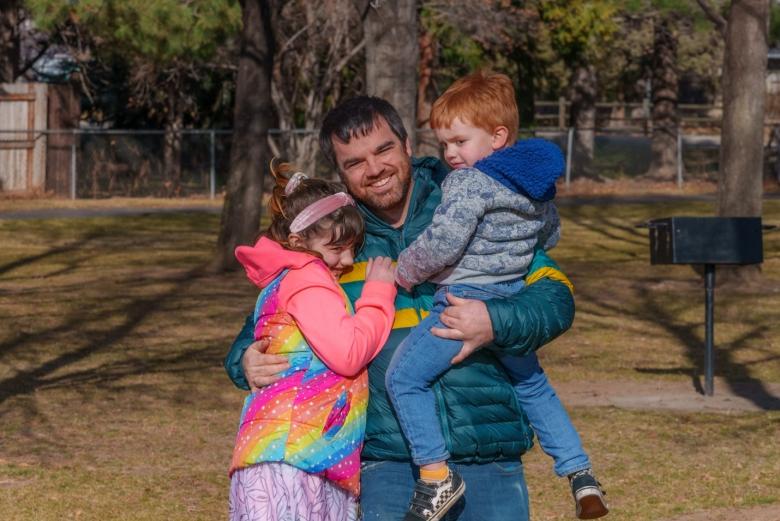
Photo courtesy of Explore Marketing LLC.
Mellissa Kamanya, Bend-Redmond Habitat’s director of grants management, remembers first meeting David. “It was clear that as he was stepping up and becoming full-time dad to these two kiddos, he needed some more space and some more privacy,” she says.
Building community
Once he was selected to become a Habitat homeowner, David began working on his sweat equity hours, which included helping to build his own home and volunteering to help build other homes in the townhome community. During the builds, he fostered relationships with his future neighbors and their families that have grown deeper since the family has moved in. Now the children play together while the grownups talk.
The family’s favorite activity is gathering together in their living room to watch movies, and Cadence enjoys venturing out to the second-story deck in the evenings to take pictures of the sunsets and nearby mountains. David loves that the home features solar panels that help lower monthly utility costs and it’s in a convenient location for him and the children. “We’re really close to the park and their school,” says David, whose job at a medical equipment manufacturing company is nearby as well.
Working together to advance affordable housing
Grant funding from the Wells Fargo Foundation helped make David’s mortgage more affordable by supporting the construction cost of his home. “The financial contribution from Wells Fargo allowed us to structure a mortgage that was based on David’s income, which gave David the security that he was taking on a loan he could manage,” says Mellissa.
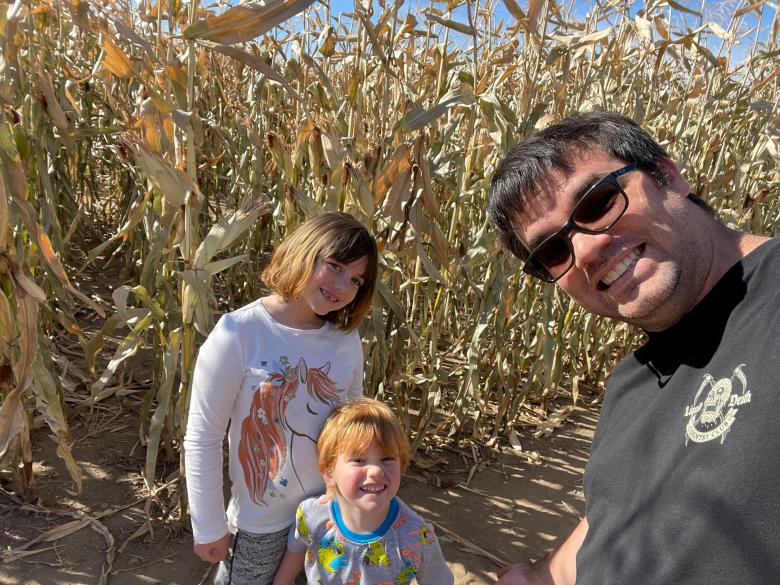
Since 2010, Wells Fargo and the Wells Fargo Foundation have donated more than $119 million to Habitat for Humanity International and local affiliates in support of affordable and sustainable housing. Damon Dishman, Wells Fargo’s small business director for the Pacific region, has volunteered with Habitat for more than two decades and has seen firsthand the significant impacts of affordable homeownership for families and communities. “When I think about David’s story of wanting a safe place for his kids to grow up and how he sought parks and walkability, I know that also creates stability for not only David and his family, but it also helps create stability for the local small business community,” says Damon. “David works for a local business, and him having a home helps businesses operate in the local market because its employees are able to live in the communities where they work.”
Pirates, butterflies and peace of mind
David, Cadence and Grayson are settled in and thriving in their new home, and David is working on decorating the children’s bedrooms. “I have a friend who is going to surprise the kids with murals. My son wants a beach and pirate theme. My daughter wants fairies and butterflies,” David says.
Now that he has a home with an affordable mortgage and his children have plenty of room to grow, David has peace of mind. “Home is my safe place,” he says.
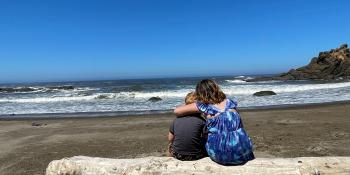
Home makes the difference
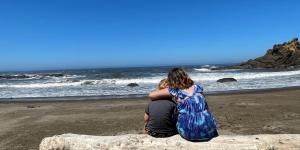
Habitat COO Patrick Canagasingham urges COP27 climate change conference delegates to prioritize adequate and affordable housing
Achieving a brighter future through sustainable building
Learn the details of how Habitat and Whirlpool Corporation’s 23-year partnership has helped families around the world build strength and stability through safe and affordable housing.
Whirlpool Corporation has actively partnered with Habitat for Humanity for 23 years, helping to broaden and improve the ways in which families around the world improve their housing and achieve financial stability.
During our long and fruitful relationship, Whirlpool has:
- Provided 212,807 appliances like ranges and refrigerators for Habitat homes in the U.S., Canada, Europe, Africa, Asia, the Middle East and Latin America.
- Served more than 971,000 people globally.
- Donated $136 million toward our shared vision of a world where everyone has a decent place to live.
Deb O’Connor, Whirlpool Corporation’s director of corporate reputation and community relations, shares why Whirlpool Corporation partners with Habitat and why the company passionately advocates for affordable housing.

Why has Whirlpool Corporation made it a priority to partner with Habitat?
We believe that the four walls around us have the power to unlock immense opportunity for the homeowner and their family. It starts with decent and affordable housing – the foundation of a stable life and a bright future. That’s why Whirlpool Corporation gives purposefully of our time, funds and products to the communities where we live and work.
Everything we do rolls up to our vision to be the best kitchen and laundry company in constant pursuit of improving life at home. This is especially true in our approach to social responsibility.
What is Habitat’s BuildBetter with Whirlpool initiative?
The three-year BuildBetter with Whirlpool initiative expands upon Habitat’s current efforts to help homeowners mitigate the impact of climate change with more energy-efficient and resilient homes. The purpose of the initiative is to continue to promote energy-resilient, hazard-resilient and climate-resilient housing at Habitat affiliates across the U.S., leaning on lessons learned over the course of more than a decade.
The three-phase initiative began in 2021 and includes research and collaboration; a strategic pilot of proven, successful tactics in target markets; and ultimately resources that can be expanded upon and immediately implemented across the U.S. By working with Habitat’s research and measurement team, we can evaluate how homeowners are living in the homes, which will inform changes that can be made in the future so that homes are designed that are good for the environment and for the homebuyer’s specific needs.
Habitat homes built through this initiative are designed to have a 15% greater overall energy efficiency compared to local code minimums. They’re also built stronger to better withstand increasing severe weather events and changing climate conditions, and the homes produce less in operational carbon emissions.
The homes are built using regionally based, specific methods and materials to meet or exceed regional and national verification program requirements, which can include increased insulation and air sealing, higher efficiency heating and cooling equipment, fire-resilient materials, and fixtures that reduce water consumption. In some markets, homes might feature a safe room that meets or exceeds FEMA requirements, offering reinforced shelter in a high-wind event.
How else does Whirlpool Corporation work with Habitat around the world?
Whirlpool Corporation supports Habitat’s work in Poland, including Habitat Poland’s expansion of its Warsaw social rental program in response to the war in Ukraine. Through the program, Habitat Poland acts as a mediating agent, leasing units and then renting them at affordable rates to tenants who can’t afford free-market rates. The program is being tailored for refugees from Ukraine, who will need a larger subsidy at the outset as they look for jobs and become more familiar with the community. Whirlpool Corporation donated appliances that will be used in the rental units. Also, in July 2022, Whirlpool Corporation employees gathered in Gliwice, Poland, to help renovate homes that will be part of the social rental program.
How and why has Whirlpool Corporation advocated for decent housing?
Through Cost of Home, Habitat’s U.S. advocacy campaign, we’re informing and educating Whirlpool Corporation employees about policy solutions for home affordability, which can be a tool to recover from COVID-19 and to advance racial equity.
We also support Habitat’s global housing forums and really value how they bring together experts and housing advocates from a wide variety of sectors to connect and collaborate around practical solutions for increasing access to affordable housing.
During these forums, Habitat announces Innovation Awards winners, which celebrate global innovators in the housing sector. In 2021, we were proud to sponsor the awards’ inspirational practices category and help shine the spotlight on public and public-private partnerships that are actively increasing access to decent and affordable housing for those who need it most.
At Whirlpool Corporation, we always seek to identify new ways to demonstrate our commitment to our goal of making life in our homes, our communities and our operations better today and in the future. Our partnership with Habitat helps us demonstrate environmental and social responsibility through the life-changing work that we help make possible.
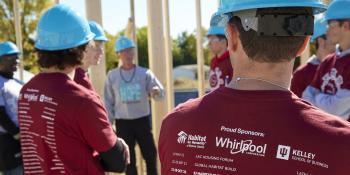
Achieving a brighter future through sustainable building
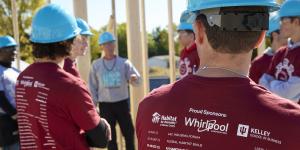
Building resilience in Puerto Rico through secure land tenure
After hurricanes Irma and Maria barreled across Puerto Rico, many families were unable to access disaster assistance because they did not have proof of a clear title for their homes. In response, Habitat and AbbVie began working together to help families secure land tenure through title clearance.
Land tenure describes people’s relationship to the land in their particular region. Land tenure can be based on legal, customary, informal or social practices that differ in communities around the world.
When families lack secure land tenure proving documented ownership of their homes, it can affect their ability to establish legal access to basic services and utilities, make them vulnerable to forced evictions and contribute to other inequalities in housing and livelihoods. A lack of secure land tenure can also impact a family’s access to disaster funds, affecting their ability to recover and rebuild.
When hurricanes Irma and Maria devastated Puerto Rico in 2017, many families were unable to access post-disaster assistance and federal aid because they did not have proof of a clear title for their homes as required by FEMA, though it was not a part of their standard guidelines. According to the Puerto Rico Planning Society, an estimated 260,000 homes, representing 1.3 million people, were built without proper permits or clear titles.
In the aftermath of the storms, Habitat for Humanity implemented a holistic hurricane recovery program in Puerto Rico with the support of AbbVie, a research-based global biopharmaceutical company and one of the island’s largest employers. Efforts on the island are focused on home repairs and new construction, helping homeowners secure land tenure, capacity building, and fostering policies and systems that will advance long-term improvement to shelter and land resilience issues. Since land tenure is complicated and location-specific, Habitat partnered with the local nonprofit Fundación Fondo de Acceso a la Justicia to help homeowners secure land tenure through title clearance.
Land tenure in Puerto Rico
“In Puerto Rico, land tenure is a concept that is used to talk about residents or communities living on a plot of land, but not necessarily in a formal way. It could be an informal way — which doesn’t mean it’s an illegal way when we say it’s informal,” says Amaris Torres Rivera, executive director of Fundación Fondo de Acceso a la Justicia. “It means that they are possessing the land, but they don’t necessarily have a document that says so because maybe their father, mother or grandparents died who were the rightful owners at one point and then the legal procedures after that weren’t necessarily made.”
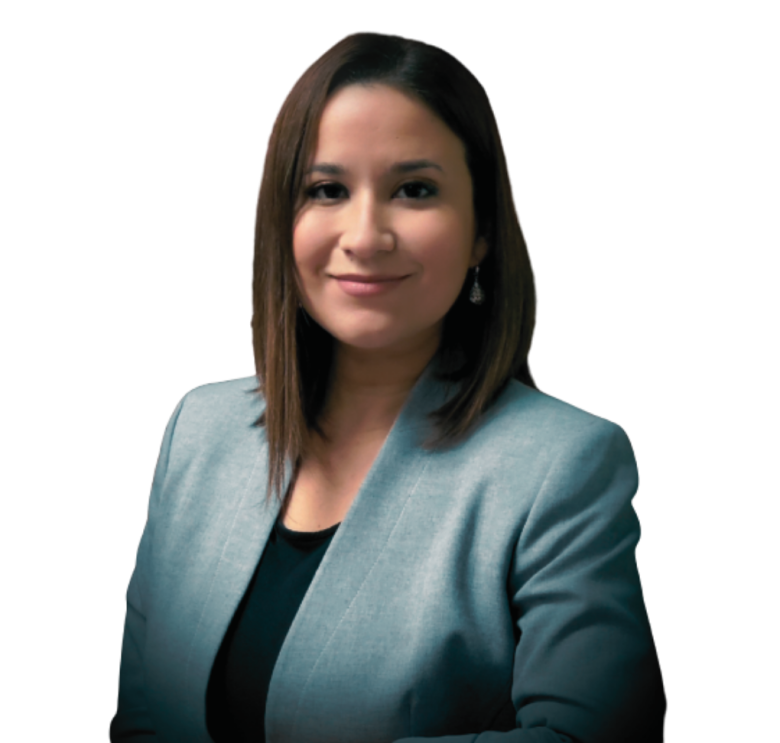
Amaris Torres Rivera, executive director of Fundación Fondo de Acceso a la Justicia
Puerto Rico’s civil code is based on Spanish law dating back to the late 1800s. Under the civil code, families living on a plot of land can be recognized as the rightful owner after inhabiting said land for a period of time, even if the land was owned by someone else. The civil code also does not require that property be submitted to Puerto Rico’s property registry after it has been acquired by a new owner, which can be a cost-prohibitive process. “It could cost $300 if the property is cheap, but it could be up to thousands of dollars to register your property,” says Torres Rivera. “When we deal with our participants, who are low-income families, they won’t be able to pay $300 or $500. They prefer to invest that money buying food and paying bills rather than submitting to a property registry when legally they know they don’t have to do it.”
Though Puerto Rico doesn’t require residents to have a clear title to property, proof of a clear title was required to qualify for disaster funds after hurricanes Irma and Maria by those offering aid. That’s why Habitat and Fundación Fondo de Acceso a la Justicia have been working together to help ensure families are able to receive the funds they need to rebuild and be more resilient to future disasters through title clearance, which is part of a larger, collective approach to addressing housing security issues in Puerto Rico. “People deserve the security of knowing that when funds come, especially these recovery funds, they will have access,” says Torres Rivera.
Habitat and the Fundación have helped 489 families navigate complex legal procedures and clear their titles through the program, as of July 2022. Ultimately, 500 families will receive legal aid through the work of Habitat and the Fundación to help them obtain clear titles. Habitat also developed a one-page application for people in Puerto Rico to apply for home repair assistance that helped inspire the adoption of a more efficient and simplified application process on the island for those seeking assistance.
Securing a brighter future
In addition to this vital tenure work, Habitat partnered with the University of Puerto Rico School of Law Master Trust to conduct an in-depth evaluation of the existing land trust on the island to support the creation of new policies and systems that will improve shelter and land resilience issues in the long term. “Our hope was that this research would provide insight and learnings into the complex evolution of land tenure in Puerto Rico and lead to new legislation that improves security of tenure for homeowners in the future,” says Amanda Silva, executive director of Habitat for Humanity of Puerto Rico. That hope was put into action when Habitat made policy-change recommendations to the local and federal governments that addressed tenure security in Puerto Rico based on local and international research.
Land is the foundation for safe and affordable shelter. By working to secure official title clearances and continuing to support policies that will further improve security of tenure, Habitat and AbbVie are committed to working alongside homeowners in Puerto Rico to build a solid foundation for a bright and resilient future.
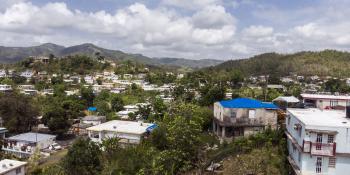
Building resilience in Puerto Rico through secure land tenure
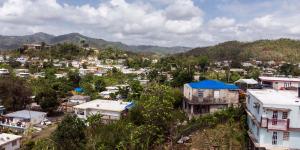
Aging in Place FAQ
Habitat for Humanity works to help older adults age at home and in communities of their choice through our Aging in Place program. Check out common questions about our work.
Individual retirement account distributions
Don’t need your retirement savings as much as you once thought? Find out how a qualified charitable distribution from your IRA can benefit you and support Habitat at the same time.
Bringing cutting-edge housing solutions to scale
With support from the Hilti Foundation, Habitat for Humanity’s Terwilliger Center for Innovation in Shelter is working to expand low-income families’ access to innovative housing products, services and financing through market-based solutions.
An estimated 1.6 billion people are living in inadequate shelter globally – a crisis that has been exacerbated by a lack of attention to, and investment in, informal housing markets. With support from the Hilti Foundation, Habitat for Humanity’s Terwilliger Center for Innovation in Shelter is working to expand low-income families’ access to innovative housing products, services and financing through market-based solutions.
Since 2017, the Terwilliger Center has helped millions of people access improved housing solutions. These are families like Ed and Gina in the Philippines, who used the little money they had to hire an informally trained mason and selected inexpensive, ineffective materials. Ed and Gina made improvements to their home bit by bit — save a little, build a little – and after many years they had a place to call their own. But when Super Typhoon Odette struck, their home was significantly damaged. Now, with support from the Terwilliger Center, they are building back stronger than ever equipped with more knowledge and better materials, like EcoBricks produced by Green Antz.

